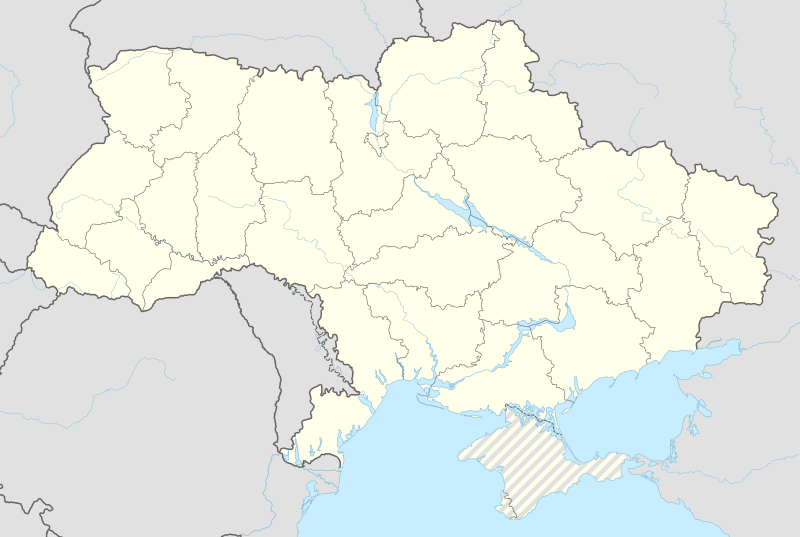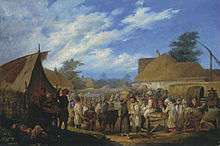Ichnia
| Ichnia Ічня | |||
|---|---|---|---|
| Town | |||
|
Church of Transfiguration on the river Ichen’ka | |||
| |||
 Ichnia Location of Ichnia | |||
| Coordinates: 50°51′00″N 32°24′00″E / 50.85000°N 32.40000°ECoordinates: 50°51′00″N 32°24′00″E / 50.85000°N 32.40000°E | |||
| Country |
| ||
| Oblast | Chernihiv Oblast | ||
| Raion | Ichnia Raion | ||
| Founded | 14th century | ||
| Сity status on | 1957 | ||
| Area | |||
| • Total | 16.16 km2 (6.24 sq mi) | ||
| Population (2014) | |||
| • Total |
| ||
| • Density | 780/km2 (2,000/sq mi) | ||
| Time zone | EET (UTC+2) | ||
| • Summer (DST) | EEST (UTC+3) | ||
| Postal code | 16700-16703 | ||
| Area code(s) | +380-4633 | ||
| Website | http://ichadm.cg.gov.ua | ||
Ichnia (Ukrainian: Ічня, Ukrainian pronunciation: [ˈit͡ʃnʲɑ]) is a town in the Chernihiv Oblast of Ukraine, located on the river Ichen'ka. It is the center of a raion of the same name.
History
The city got its name from the river named Ichena (or Ichen'), which was in time renamed into Ichen’ka.
The first information about Ichnia dates back to the 14th century. From the 14th to 16th centuries, it was ruled by the Grand Duchy of Lithuania and the Polish–Lithuanian Commonwealth.
In the middle of the 16th century, Ichnia was granted with the status of a market town. In 1666, a town hall was built. Probably at this time, the Ichnia's castle was built. Residents of the city participated in the struggle against the Swedish army of Charles XII of Sweden during the Great Northern War.
In 1748, Ichnia's 20 households belonged to Knyaz N. Saakadze, and 119 households - Colonel from Pryluky G. Galagan. The town had a distillery, 6 water mills, and a brickyard.

As of 1788, three annual fairs were held in Ichnia, in which residents traded bread, cattle, victuals, and wooden utensils.
There were four schools in Ichnia in the 18th century.
In 1812, the Cossacks of Ichnia fought in the Chernigov Regiment during French invasion of Russia.
At the beginning of the 19th century, landowner G. Galagan founded a cloth factory in the town, as well as a sugar factory, 2 distilleries, brick factories, and saltpeter factories.
In 1894, the town was included into a local railroad connection. In 1897, there were four stone churches. The town operated a post office, hospital, rural and ministerial school, and library.
In 1957, Ichnia received the status of a town.
At present, the leading industry in Ichnia is the food industry (alcohol, tobacco, feed mill, canning, and cheese-milk powder).
Notable natives
Sonia Greene (16 March 1883 - 26 December 1972) - a one-time pulp fiction writer and amateur publisher, a single mother, business woman, and successful milliner, who bankrolled several fanzines in the early 20th century.
Ivan Martos (1754 — 5 April 1835) - a Russian sculptor and art teacher of Ukrainian origin, who helped awaken Russian interest in Neoclassical sculpture.
References
- Ichnia, Chernihiv Oblast. Official portal of the Parliament of Ukraine (Verkhovna Rada)
- Official site of the State Administration of Ichnia Raion
External links
- The murder of the Jews of Ichnia during World War II, at Yad Vashem website.


